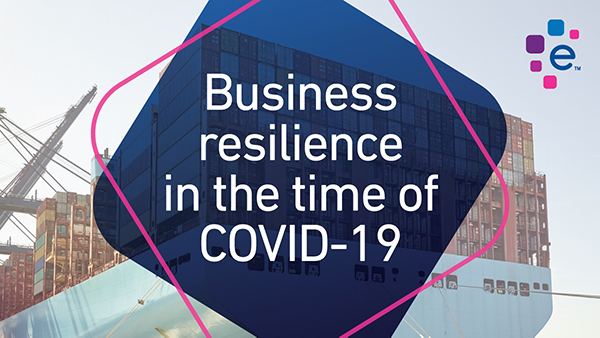
In a favorable economic climate, business resilience is often treated as an afterthought. Success is measured in rapid growth and leaps of progress, while failure is little more than a tempering of that expansion.
It’s only when things slow down – like during a global pandemic – that companies are forced to take stock of the ground they stand on. As the economy slows to a crawl and entire industries feel the squeeze, business resilience will determine which organizations make it through to the other side.
Whether you’re on the supply side or the demand side, chances are your organization is being tested right now. Here are some practical strategies to stay resilient in the time of Covid-19.
 Gerard Smith, President of Global Risk Management Solutions (GRMS), works with companies who are either on-boarding new suppliers or evaluating current suppliers. When the Covid-19 pandemic disrupted supply chains in most industries, many of these companies started scrambling to find replacement suppliers.
Gerard Smith, President of Global Risk Management Solutions (GRMS), works with companies who are either on-boarding new suppliers or evaluating current suppliers. When the Covid-19 pandemic disrupted supply chains in most industries, many of these companies started scrambling to find replacement suppliers.
Finding a reliable supplier is always a challenge, but it’s even more difficult during a global pandemic and economic crisis.
The best practice here is still to vet new suppliers carefully. Smith’s company creates a risk assessment program for Experian clients that analyzes 50 different financial and legal components, including the following:
- If they’re on the OFAC sanctions list
- If they’re financially stable
- If they actually have the certifications they claim to have
- If they have insurance
- If they’ve received negative press
Many companies fail to do their due diligence when it comes to suppliers, especially if they’re trying to fulfill orders quickly. More often than not, this leads to bigger problems down the line. If you hire a supplier that’s hemorrhaging money, for instance, they may file for bankruptcy right after you pay them for a major shipment.
Companies that use GRMS will be notified regularly if a supplier’s financial or legal status changes. If a supplier cancels their insurance coverage, for example, that could indicate financial struggles. Staying abreast of information like this allows businesses to be proactive with suppliers and avoid being blindsided.
Make Sure Clients Are Financially Healthy
 On the flip side of the buyer-supplier relationship, suppliers are now being asked to extend due dates. Deciding how to comply with these requests can be tricky. Most want to be understanding and reasonable, but there is often legitimate concern over whether they’ll receive payment.
On the flip side of the buyer-supplier relationship, suppliers are now being asked to extend due dates. Deciding how to comply with these requests can be tricky. Most want to be understanding and reasonable, but there is often legitimate concern over whether they’ll receive payment.
Brodie Oldham, Senior Director of Analytic Consultancy for Experian, said Experian offers several services for suppliers who need to gauge how reliable their customers are in this moment.
Experian has a special Covid-19 risk index that suppliers can overlay on top of existing credit models. This tool can help determine whether or not a client is in an unstable financial position.
If the company operates in a highly impacted part of the country or industry, the supplier can use that information to change the terms. For example, they can sell fewer items to minimize the risk of an unpaid invoice.
Experian also monitors credit utilization for business credit cards and other lines of credit. If a company’s credit utilization surpasses a certain threshold, they can alert the supplier who can halt future shipments until the utilization decreases.
Find Faster Ways to Evaluate Creditworthiness
 Many suppliers depend on a company’s credit information to determine its reliability as a buyer. Likewise, credit bureaus are being forced to reevaluate their models in response to the changing business landscape brought on by Covid-19.
Many suppliers depend on a company’s credit information to determine its reliability as a buyer. Likewise, credit bureaus are being forced to reevaluate their models in response to the changing business landscape brought on by Covid-19.
Enter the agile credit function. The term agile has traditionally been used in the context of software development to describe an iterative approach where requirements and solutions evolve through collaboration between cross-functional teams. It allows companies to adapt to new requests quickly and improve time-to-market. Agile is all about being nimble and responsive – something credit bureaus are prioritizing in today’s uncertain economy.
Agile credit means finding new, faster ways of evaluating customers and determining their ability to pay, in a time when that information can change daily.
“When everything shut down in March, credit people got thrown for a loop,” said Dan Meder, Vice President of Consulting, Product Marketing and Alliances for Experian Business Information Services. “They needed a way to manage that change very quickly.”
That’s where having an agile credit approach comes in.
“It’s about using agile principles in your credit function to respond more quickly to changing market needs,” Meder said.
Using an agile credit system helps suppliers decide what kind of terms to offer their customers. Many companies are asking suppliers to extend their terms and due dates, often switching from net-30 to net-60.
Suppliers then have to decide if they can trust these companies to repay them within that longer time frame, Meder said.
If companies in this position use an agile credit function, they can be more responsive and confident in the terms they set out because they’re basing their credit policies on the current state of their customer environment. This requires operating with the latest possible information on how current economic conditions are affecting their customers.
Meder said that making credit function more agile requires direction from the head of the credit department and other members of that department. They can also utilize software programmers if the automatic process needs to be updated or any outside consultants for specific analytical expertise.
“The idea is to bring together a team of people with direct involvement in managing the credit function to assess how best to manage the customer experience given the current state of the customer environment,” he said. “This includes setting policies around risk assessment as well as credit terms and collection processes.”
Meder said companies should have technology that allows them to tinker with their credit function so they can make changes quickly.
“This is especially true in a fast-changing or uncertain environment such as what we are seeing with COVID-19 and the uncertain effect it is having on our economy’s future,” he said. “In fact, it is turbulent times such as these where being “agile” is most important since the credit department needs to be able to alter course quickly if the customer environment changes for better or for worse.”
Consider Being Flexible With Clients
While delayed payments from clients is upsetting, avoid taking your current client relationships for granted. While a more stringent approach from suppliers is understandable right now, Meder cautions companies to remember that the pandemic will end at some point. At that time, companies will remember which suppliers were flexible about payments, due dates and terms – and which companies weren’t.
“If you weren’t good to them while they were struggling, they’re going to forget about you when things turn around,” Meder said.
To find out how fine-tuning your company’s credit function can help it weather the current economic crisis, reach out to your Experian representative.

